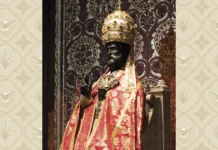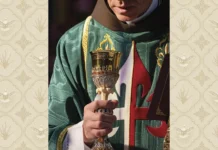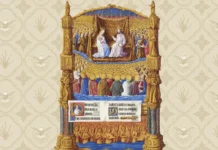On the day of the solemn commemoration of all the faithful departed, priests may celebrate three Masses, so that many of our brethren who suffer in Purgatory may happily join the heavenly Blessed of the Church Triumphant on that day.
Since, by its nature, the unbloody Sacrifice of the Altar is in no way different from the Sacrifice of the Cross, it not only brings glory to the inhabitants of Heaven and serves as a salutary remedy for those still in the miseries of this life, but it is also of great value in ransoming the souls of the faithful who rest in Christ.

Christians have always striven to assist the faithful departed
This is a constant and perpetual doctrine of the Church. The vestiges and arguments for this doctrine – which over the centuries has provided enormous comfort to all Christians and has stirred the good to a lively admiration for Christ’s infinite charity – can be found in the oldest liturgies of the Latin and Eastern Church, in the writings of the Holy Fathers, and, finally, are clearly expressed in many decrees of ancient Synods.
With a special solemn definition, the Tridentine Ecumenical Council proposed this very thing to our Faith, teaching that the “souls held in purgatory are helped by the suffrages of the faithful, above all by the Sacrifice of the Altar, pleasing to God.” And it punished with excommunication anyone who claimed that the Holy Sacrifice should not be offered “for the living and the dead, in reparation for sins, in payment for punishment and for other necessities.”
Indeed, never did the Church, a compassionate mother, conduct herself contrarily to this teaching; at no time did she cease to earnestly exhort the faithful to ensure that the souls of the deceased were not deprived of the spiritual assistance that flows abundantly from the Sacrifice of the Mass. And at this point we must praise the Christian people who never lacked love and commitment in offering suffrages for the deceased.
The history of the Church gives witness to the fact that when the virtues of faith and charity impelled souls, kings and peoples were more vigorously committed, wherever the Catholic name was spread, in order to obtain the purification of souls in Purgatory.
An ancient privilege extended to the entire world
The ever more ardent piety of our ancestors gradually formed in the Kingdom of Aragon, many centuries ago, the following custom: in the solemn commemoration of all the faithful departed, secular priests celebrated two Masses, and regular priests celebrated three.
Benedict XIV, our predecessor of immortal memory, confirmed this privilege, not only for just reasons, but also at the request of Don Ferdinand VI, Catholic king of Spain, and Don John V, king of Portugal. Thus, in his Apostolic Letter of August 26, 1748, he decided that every priest of the regions subject to these two kings should be given the faculty to celebrate three Masses on the day of the solemn commemoration of the faithful departed.
Over the course of time, many people, from bishops to citizens of every class, have sent repeated appeals to the Apostolic See to extend this privilege to the entire world; the same concession was repeatedly requested of our predecessors and also of us at the beginning of our Pontificate. […]
Mercy moves us in a special way today
Therefore, after again inciting the conscience of those who, in this matter, fail in their duty of charity towards the souls of the deceased – for whom we have nurtured great affection since childhood – we are strongly urged, as far as possible, to make reparation through the suffrages which souls have lacked, with grave harm to them.
Mercy moves us in a special way today when, due to the terrible fires set ablaze in almost all of Europe, we have before our eyes so many young people who, in the flower of their age, die prematurely on the battlefields. Even if they have the piety of their relatives to make suffrage for their souls, is this enough to satisfy their needs?
Since we became, by God’s will, the common father of all, we want with paternal generosity to make these dear and beloved children, torn from life, sharers in the treasure of the infinite merits of Jesus Christ.
Consequently, after invoking the light of heavenly Wisdom and consulting some Cardinals of the Holy Roman Church, members of the Congregation for the Discipline of the Sacraments and the Congregation of Sacred Rites, we decree in perpetuo the following:
- On the day of the solemn commemoration of all the faithful departed, priests throughout the Church are permitted to celebrate three Masses under the following conditions: one of them for a freely chosen intention and with the possibility of receiving alms; the second, without alms, is dedicated to all the faithful departed; the third is celebrated in accord with the intention of the Supreme Pontiff, as specified above.
- In as far as is necessary, we confirm with our authority what our predecessor Clement XIII granted in his letter of May 19, 1791, namely, that on the day of this solemn commemoration all the altars should be privileged. […]
We should pray for our brethren who suffer
As for the rest, we are convinced that all Catholic priests, although they can celebrate only one Mass in commemoration of the faithful departed, will willingly and zealously make use of the important privilege that we have granted them.
We earnestly exhort all the children of the Church, conscious of their numerous obligations towards our brethren who suffer in Purgatory, to fulfil their sacred duties on that day with great faith.
Thus, thanks to a great salutary wave that penetrates Purgatory through so many beneficial suffrages, many souls of the deceased can happily join the heavenly Blessed of the Church Triumphant.
We decree that all that we have established through this Apostolic Letter regarding non-repeatable Masses shall remain valid and constant in perpetuo, notwithstanding any law promulgated in the past by our predecessors. ◊
Excerpts from: BENEDICT XV.
Incruentum Altaris, 10/8/1915
Translation: Heralds of the Gospel







